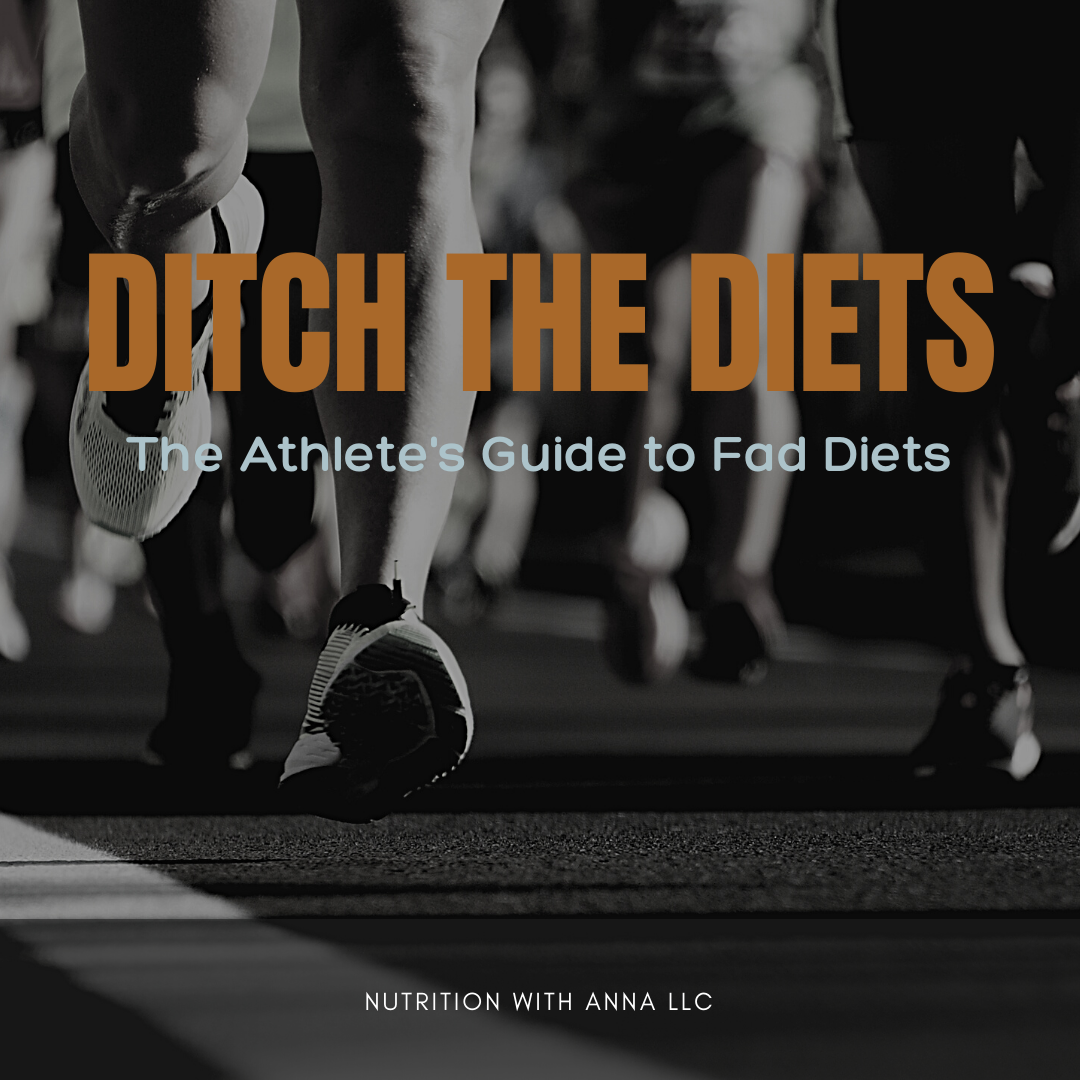Ditch the diets
Diet talk is so commonplace. We’re always hearing of the latest fad diet, whether it’s from cousin Sally who lost 10 pounds in two weeks or co-worker Tom who has never felt better since eliminating gluten.
And there’s tons of information (and misinformation) available in the media, and it can be challenging to sift through it all. There are so many diets, supplements, and and “cleanses” available, and you wonder if any will help you achieve the athletic and wellness goals you have set.
Before trying a fad diet, remember that athletes have specially dietary needs, including:
High energy needs. Athletes need a larger amount of calories than their non-athletic counterparts. There are a couple of reasons for this. First, training burns calories. Going out on a run or practicing soccer for 2 hours a day require energy. Second, athletes generally have a larger amount of fat free mass (muscle) than non-athletes. A higher fat free mass is correlated with a higher metabolism.
High carbohydrate needs. The primary fuel source for training is carbohydrate.
High sodium needs. When athletes sweat, they lose both fluid and electrolytes. The electrolyte lost in the greatest quantity is sodium.
Need for well-timed nutrition. Athletes need to fuel before activity (to provide fuel for the muscles) and after activity (to promote recovery). Also, they need to fuel frequently to keep energy levels high and prevent loss of muscle mass.
Now consider many of the fad diets that you know. They often limit the very things that athletes need - calories, carbohydrates, and sodium. In addition, many diets have rules about when it’s “ok” to eat and some diets limit eating to within certain hours.
Diets that require low carbohydrate intake are going to lead to low energy levels, decreased cognitive function, worsened mood, and increased risk of fatigue, injury, and cramping.
Diets that require low sodium intake are going to hurt your ability to rehydrate, impair muscular function, and increase your chances of cramping.
Diets that put restrictions on when you can eat will lead to training without adequate energy, loss of muscle mass, decrease in metabolism, and an increased risk of lightheadedness or fainting.
Below you’ll find a quick description of 5 fad diets - what is required, and why this diet is unlikely to improve athletic performance.
Gluten Free Diet: the gluten free diet is a medical diet that manages the symptoms for people who have been diagnosed with celiac disease. When following a gluten free diet, all foods that contain gluten must be avoided. This includes all wheat, barley, and rye. The list of foods containing gluten is extensive, including bread, cereal, bagels, cookies, salad dressing, breaded meats, sauces, pasta, and energy bars. Why should athletes ditch this diet (unless, of course, they have celiac disease)? Because following a gluten free diet makes it very challenging to meet your high carbohydrate needs. There is also a risk for nutrient deficiencies since many of the gluten-containing foods provide key vitamins & minerals (or are fortified with vitamins & minerals).
Intermittent Fasting: the intermittent fasting diet requires the dieter to follow a schedule that includes periods of fasting and non-fasting. While there are many different suggested schedules, it is common to fast for 16 hours of the day (and eat for 8 hours of the day). Why should athletes ditch this diet? Because performance & recovery are hindered during fasting. And if athletes are training while fasting, they are at increased risk of lightheadedness & fainting.
Ketogenic Diet: the ketogenic diet was developed to stop seizures in children with epilepsy. It wasn’t intended to be a mainstream diet. The idea is to put your body into a metabolic state called ketosis where your body burns fat for energy. In order to be in ketosis, you can only eat 25-50 grams of carbohydrates per day, a small amount of protein, and the rest of your calories must come from fat. There can be absolutely no days off from this diet if you want to remain in ketosis. Why should athletes ditch this diet? Because following a ketogenic diet doesn’t provide enough carbohydrates to fuel activity. And the type of foods that are eaten on a ketogenic diet may cause GI distress, which will also hurt your training and performance.
Paleo Diet: the paleo diet mimics the way our ancestors ate. The requirements of the paleo diet are to eat the following: low carbohydrate (no starchy fruits & vegetables), higher protein, high potassium, low sodium, and moderate/high fat. Why should athletes ditch this diet? Because it provides inadequate carbohydrates to fuel activity. In many cases, athletes cannot get enough sodium to replace sweat losses. The paleo restricts many fruits & vegetables which provide many essential nutrients. And, this diet is expensive!
Whole 30: the whole 30 diet is an elimination diet that focuses on eating whole foods. For 30 days, dieters eat “real food” and avoid all types of sugar, alcohol, grains, legumes, soy, and dairy. Why should athletes ditch this diet? Because it provides inadequate carbohydrates to fuel activity (this is a common theme of diets!). It is very restrictive, making it challenging to meet energy requirements. Like the paleo diet, it cuts out many nutrient dense foods.
Any other fad diets you’d like me to review? Let me know in the comments below!
Hi, I’m Anna!
Welcome to the Nutrition with Anna blog! Sharing recipes, sports nutrition tips, & inspiration to eat foods that fuel your lifestyle and athletic goals without rules or restrictions.

